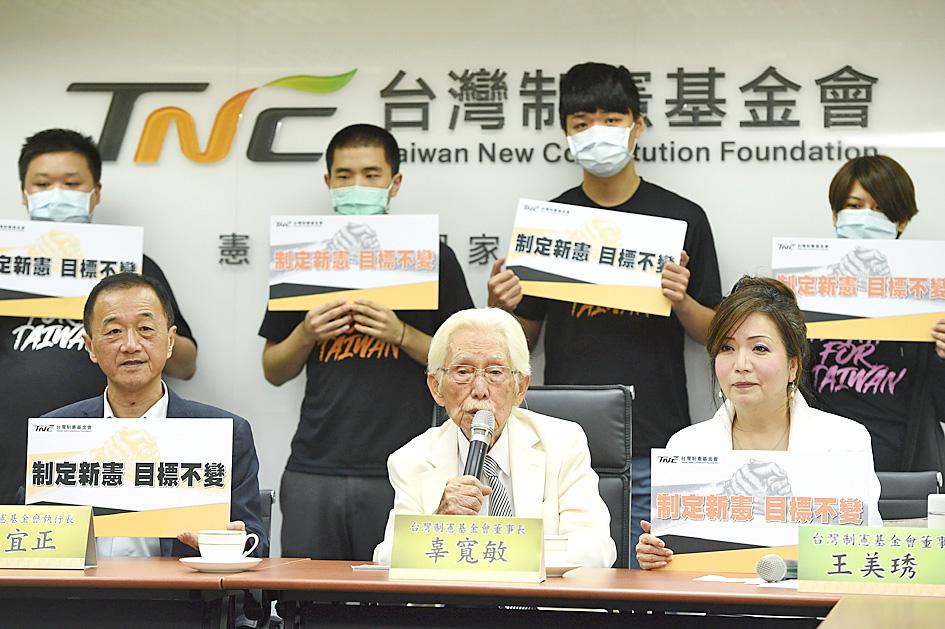The Taiwan New Constitution Foundation yesterday said it would call for constitutional interpretations and is considering submitting other referendum proposals, following the rejection on Friday of its two referendum proposals on constitutional reform.
The Central Election Commission rejected the proposals without clarifying its reasoning, foundation chairman Koo Kwang-ming (辜寬敏) told a news conference in Taipei.
“The greatest obstacle to the nation’s normalization and development is the Republic of China [ROC] Constitution,” he said, adding that democracies use referendums, not revolutions, to solve problems.

Photo: George Tsorng, Taipei Times
The 95-year-old said he has spent a half-century fighting for Taiwan, with the biggest changes coming over the past few decades in the wake of democratization.
Although the nation’s civic consciousness and international standing have improved, they are still lacking, he said.
Considering how “miserable” Taiwan was under former president Chiang Kai-shek (蔣介石), “how could the Republic of China brought by Chiang be our country?” Koo asked, adding that the nation therefore needs to draft a new constitution, so that its future can be determined by its 23 million citizens.
However, Taiwan’s biggest issue is that it is “not a normal nation,” Koo said, adding that even President Tsai Ing-wen (蔡英文) of the Democratic Progressive Party (DPP) sings the line “foundation of our party” in the national anthem and still uses the name “Republic of China.”
“Can she not use the ‘Republic of Taiwan’?” he asked, saying that Tsai is still not willing to drop the ROC name, despite polls showing that more than 90 percent of Taiwanese support the nation’s normalization.
Taiwanese support self-determination, but even with the DPP in power, the nation is still governed by a constitution that was not drafted by the nation’s people, meaning that Taiwanese are not governing themselves, Koo said.
As his time is limited, Koo said he is determined for his last contribution to be constitutional reform, and vowed to fight for the nation’s normalization, despite the difficulty of the task.
“I will not leave the DPP, nor will I resign as a presidential adviser, but I will continue pushing for a new constitution,” he said.
Koo and his contemporaries have fought for decades to establish a normalized nation on Taiwan, yet they have come up against a wall: the DPP government, foundation director Michelle Wang (王美琇) said.
The Constitution entangles Taiwan with China and traps the nation in an abnormal situation, making it impossible to even change its name to “Taiwan,” Wang said.
It is understandable that some people are fond of the ROC name, but with the global situation changing in the wake of the COVID-19 pandemic, Taiwanese do not want their nation to be confused with China, she said.
The Constitution prevents Taiwan from having a proper place in the international community, let alone call itself Taiwan, Wang added.
Aside from calling for a constitutional interpretation, the foundation is also considering forming an alliance with other organizations to continue pushing for constitutional reform, she added.

Alain Robert, known as the "French Spider-Man," praised Alex Honnold as exceptionally well-prepared after the US climber completed a free solo ascent of Taipei 101 yesterday. Robert said Honnold's ascent of the 508m-tall skyscraper in just more than one-and-a-half hours without using safety ropes or equipment was a remarkable achievement. "This is my life," he said in an interview conducted in French, adding that he liked the feeling of being "on the edge of danger." The 63-year-old Frenchman climbed Taipei 101 using ropes in December 2004, taking about four hours to reach the top. On a one-to-10 scale of difficulty, Robert said Taipei 101

Taiwanese and US defense groups are collaborating to introduce deployable, semi-autonomous manufacturing systems for drones and components in a boost to the nation’s supply chain resilience. Taiwan’s G-Tech Optroelectronics Corp subsidiary GTOC and the US’ Aerkomm Inc on Friday announced an agreement with fellow US-based Firestorm Lab to adopt the latter’s xCell, a technology featuring 3D printers fitted in 6.1m container units. The systems enable aerial platforms and parts to be produced in high volumes from dispersed nodes capable of rapid redeployment, to minimize the risk of enemy strikes and to meet field requirements, they said. Firestorm chief technology officer Ian Muceus said

MORE FALL: An investigation into one of Xi’s key cronies, part of a broader ‘anti-corruption’ drive, indicates that he might have a deep distrust in the military, an expert said China’s latest military purge underscores systemic risks in its shift from collective leadership to sole rule under Chinese President Xi Jinping (習近平), and could disrupt its chain of command and military capabilities, a national security official said yesterday. If decisionmaking within the Chinese Communist Party has become “irrational” under one-man rule, the Taiwan Strait and the regional situation must be approached with extreme caution, given unforeseen risks, they added. The anonymous official made the remarks as China’s Central Military Commission Vice Chairman Zhang Youxia (張又俠) and Joint Staff Department Chief of Staff Liu Zhenli (劉振立) were reportedly being investigated for suspected “serious

Nipah virus infection is to be officially listed as a category 5 notifiable infectious disease in Taiwan in March, while clinical treatment guidelines are being formulated, the Centers for Disease Control (CDC) said yesterday. With Nipah infections being reported in other countries and considering its relatively high fatality rate, the centers on Jan. 16 announced that it would be listed as a notifiable infectious disease to bolster the nation’s systematic early warning system and increase public awareness, the CDC said. Bangladesh reported four fatal cases last year in separate districts, with three linked to raw date palm sap consumption, CDC Epidemic Intelligence